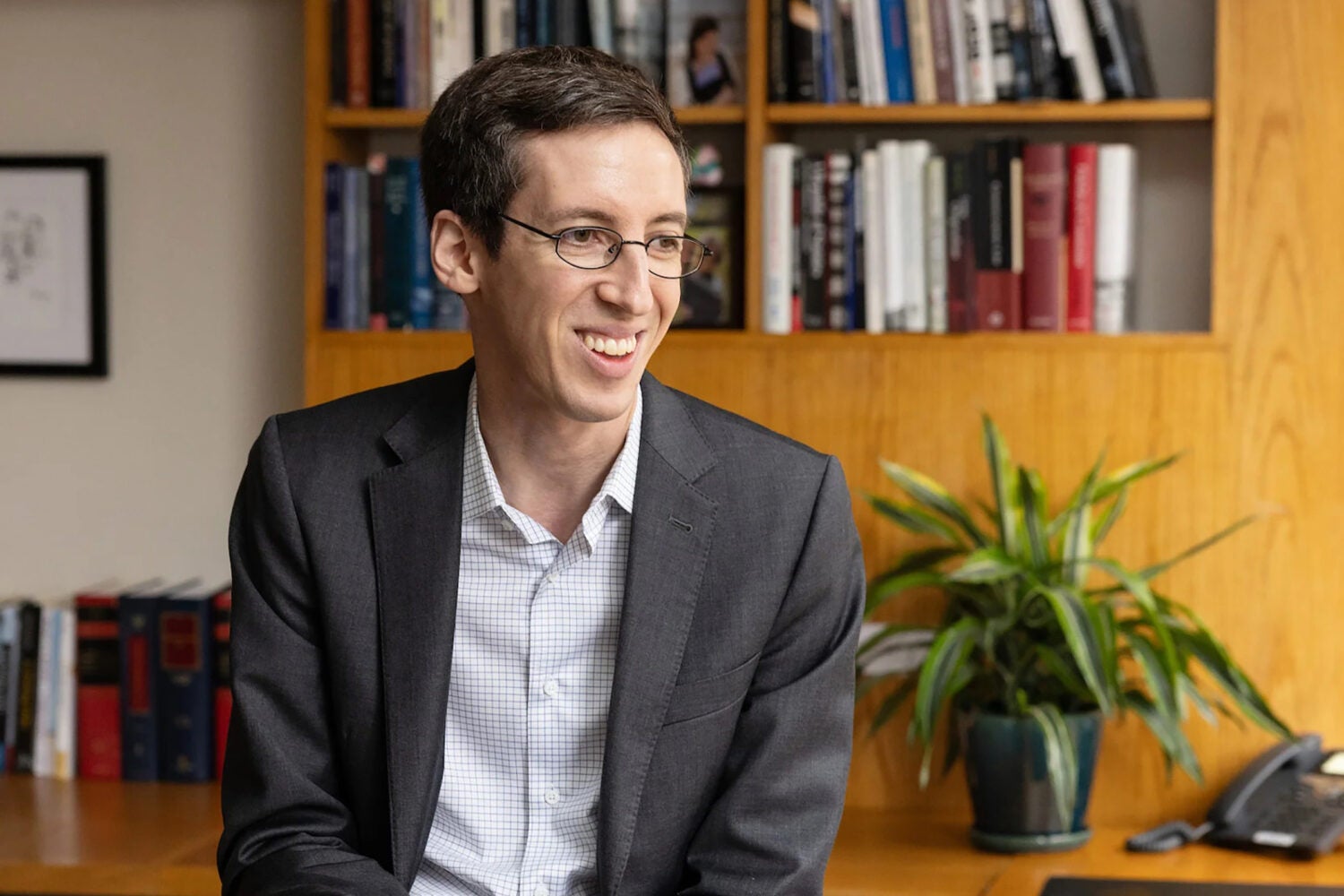Following a faculty vote last spring, Benjamin Eidelson has been promoted from assistant professor to professor of law, effective July 1, 2023.
Since joining the faculty in 2019, Eidelson has emerged as a leading legal theorist, with a body of work that spans the central areas of public law. Trained in both law and philosophy, he specializes in bringing philosophical tools to bear on contemporary legal questions.
“Ben Eidelson is a brilliant scholar who sees beyond the conventional wisdom and finds bold, rigorous, and well-grounded approaches to longstanding issues central to law,” said Harvard Law School Dean John F. Manning ’85, the Morgan and Helen Chu Dean and Professor of Law. “He is also a skilled and innovative teacher, inspiring and enabling his students to delve deeply into some of the hardest questions of constitutional law.”
“I’m humbled and delighted by this vote of confidence,” Eidelson said. “This has been an exceptionally supportive and rewarding intellectual home for me, and I’m really looking forward to continuing to think, learn, and teach in dialogue with this community in the years ahead.”
Much of Eidelson’s work has focused on contending conceptions of discrimination, equality, and respect. His first book, Discrimination and Disrespect (Oxford University Press), based on his doctoral dissertation in philosophy, has been taught in numerous seminars in philosophy departments and law schools. In recent years, Eidelson has built on that foundational work in several ways. In one article, published in the Yale Law Journal, he critiqued the Supreme Court’s recent race jurisprudence from the perspective of the court majority’s avowed commitment to “treating people as individuals.” Taking that principle as a warrant for colorblindness, he suggested, “is not only unjustified, but backwards.” Another article, written in the wake of the Supreme Court’s landmark decision in Bostock v. Clayton County, developed a distinctive account of what it means for an action to be taken “because of” a protected characteristic for purposes of a disparate-treatment claim—thereby “clarif[ying] a wide variety of current controversies” and “put[ting] a common frame on these diverse disputes.”
Eidelson has also made important contributions to recent debates about the interpretation of statutes and the authority of administrative agencies. In a forthcoming article in the Harvard Law Review (co-authored with colleague Matthew Stephenson ’03), Eidelson argues that the Supreme Court’s avowedly “textualist” Justices have failed to justify important aspects of their recent interpretive practice. In an earlier article in the Yale Law Journal, for which he received an award from the Association of American Law Schools, Eidelson explicated and defended the Court’s turn toward an “accountability-forcing” mode of review in administrative-law cases. That article focused on the Supreme Court’s decision invalidating the Trump Administration’s rescission of the DACA policy—a case in which the Court adopted a legal theory that Eidelson had advanced as counsel for one set of challengers. (Eidelson has continued to advise litigants in his areas of expertise and filed an amicus brief in a follow-up to the DACA case as well.)
Eidelson has taken up some of the most vexed issues outside the law, too. In “The Etiquette of Equality,” published in Philosophy & Public Affairs earlier this year, he offered a nuanced framework for grappling with “claims of identity-related offense or dignitary harm”—tackling examples ranging from offensive tweets to the controversy over HLS’s own former shield. The article has become a focal point for discussion of sensitive issues at Harvard and beyond, including in a plenary session for fellows of the Safra Center for Ethics earlier this month.
Eidelson is also a beloved and committed teacher. He regularly teaches the 1L Constitutional Law course, and he has co-convened the Law and Philosophy Workshop for each of the past three years, bringing leading philosophers of law from across the country to engage with students and colleagues at HLS. Students describe him as “a gem”—“next level brilliant,” “probably the smartest person I have ever met,” and “the perfect devil’s advocate.” “He actually knows everything,” one reported, “but is also incredibly humble and kind and sweet.” Many count his courses among their most challenging and rewarding classroom experiences; “I was excited to be cold-called,” another wrote, “because I knew I would be supported and wanted the chance to challenge myself.”
After graduating from Yale Law School, where he was editor-in-chief of the Yale Law Journal, Eidelson served as a clerk for U.S. Supreme Court Justice Elena Kagan ’86 and for Merrick Garland ’77, chief judge of the U.S. Court of Appeals for the D.C. Circuit. He received his B.Phil. and D.Phil. in Philosophy from the University of Oxford, where he studied as a Rhodes Scholar and was awarded the Gilbert Ryle Prize.
Want to stay up to date with Harvard Law Today? Sign up for our weekly newsletter.
